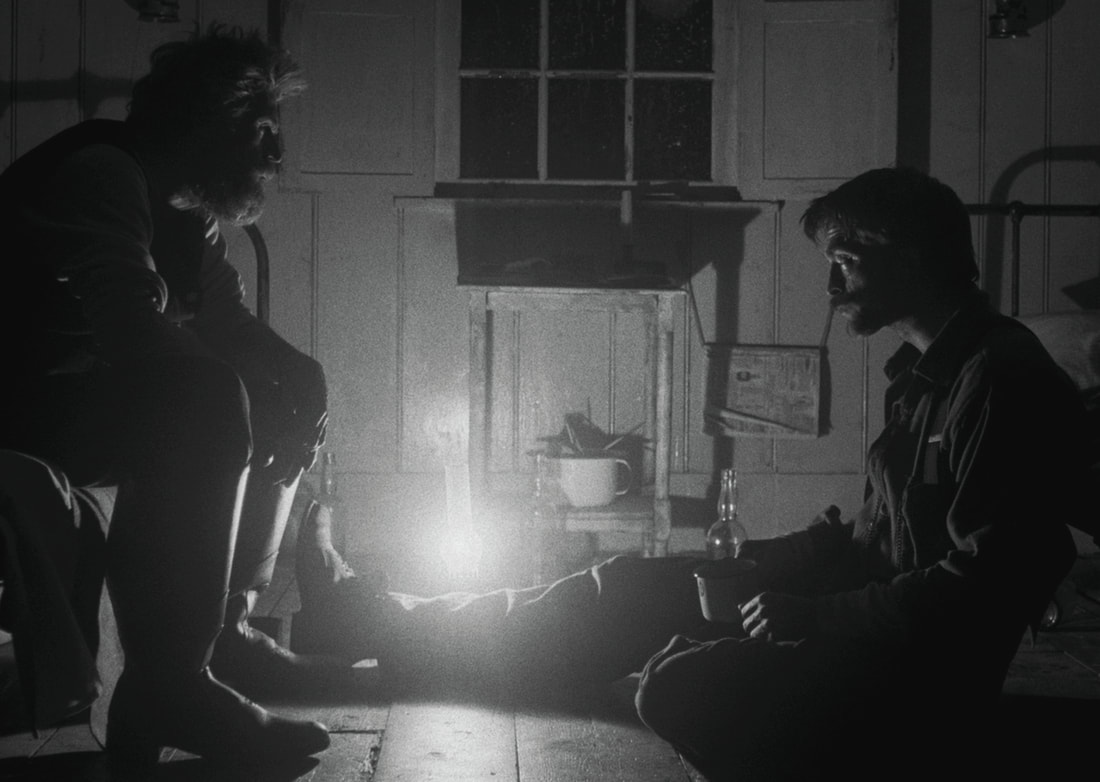ARTICLE / SHORT READCUT TO [reset]
|
BY Lucy Whiting
|
FOLLOWING his dark debut feature, THE WITCH (2015), Robert Eggers has delivered another unsettling tale. THE LIGHTHOUSE (2019) is a chaotic and claustrophobic journey between two men in the 19th century who drink together, dance together, keep secrets from each other, and drive each other to madness as they are isolated on an island. It is a scenario not too far off from our current times.
How long have we been on this rock? Five weeks? Two days? Where are we? Help me recollect. How long exactly have we been in lockdown at this point? What day is it? Is everyone else feeling extremely disorientated? It is no doubt a time of uncertainty and panic and many of us have been frantically searching for ways to stay sane during this temporary and new way of life.
Fortunately for us, unlike Ephraim Winslow (Robert Pattinson) and Thomas Wake (Willem Dafoe), we are not stuck on a secluded stormy island with a lighthouse to maintain. Although being confined to your home with family for this long can arguably feel just as intense. Through its monochrome cinematography and captivating performances, THE LIGHTHOUSE constructs an aura of ominous mystery that becomes progressively uncomfortable. Wake was once a seaman, but he ended up as a “wickie” due to a leg injury caused by a curious accident. Taking the role of senior officer, Wake controls the light itself, displaying his possessive nature from the very beginning. Winslow left his logging job in Canada for this post and, to his bemusement, is left with the more demeaning tasks that mostly resemble housework, such as gathering firewood, cleaning, emptying chamber-pots and maintaining machinery. The frustration of this belittlement, along with Wake’s fluctuant fuse of jokes and harsh criticism, quickly builds up in Winslow, diluting the air with a tension that rises steadily throughout the film. Their compact shelter means it is inevitable that the two men get under each other's feet and skin. The tension rises, slowly but surely, as Wake asserts his dominance over Winslow, who finds it increasingly humiliating. THE LIGHTHOUSE is a refreshing take on the horror genre, with back-and-forth theatrical performances and compelling dialogue that is occasionally Shakespearean. Winslow has an outburst and challenges Wake by insulting his cooking, which leads to a chilling, maledictory monologue from Dafoe. Damian Volpe’s haunting sound design and Mark Korven’s score further heighten the anxiety; the persistent droning of a distant foghorn drives the characters – and audience - mad. It is a constant reminder of Wake and Winslow’s seclusion and foreshadows the havoc that occurs later. Winslow’s suspicion grows after discovering the dark fate of Wake’s last assistant. The build-up of his suspicion, along with his bizarre and erotic hallucinations, eventually cause him to act hysterically. Amongst the madness, Winslow’s formerly concealed past is revealed, reframing him as more corrupt than we originally believed. Wake accuses Winslow of “spilling his beans”, leading him to attempt an escape from the island that fails and causes more destructive behaviour, ultimately leading to the characters’ gruesome ends. The film does not depend on supernatural themes and traditional jump-scares. Instead, its realistic tone drives us to question whether the horrors we witness are real, or if it is a psychological exploration of paranoia, fear, and delusion. Either way, the film is a study of the violent consequences that come from the detachment and repressiveness of being isolated. As devastating as things are at the moment, it is plain to see that Eggers’ version of isolation is more theatrical than our own. While the film might be deeply disturbing to many, it has the potential to be a cathartic watch in our current state of isolation, if only to see how much better we are coping than Wake and Winslow. more RESET >>> |


